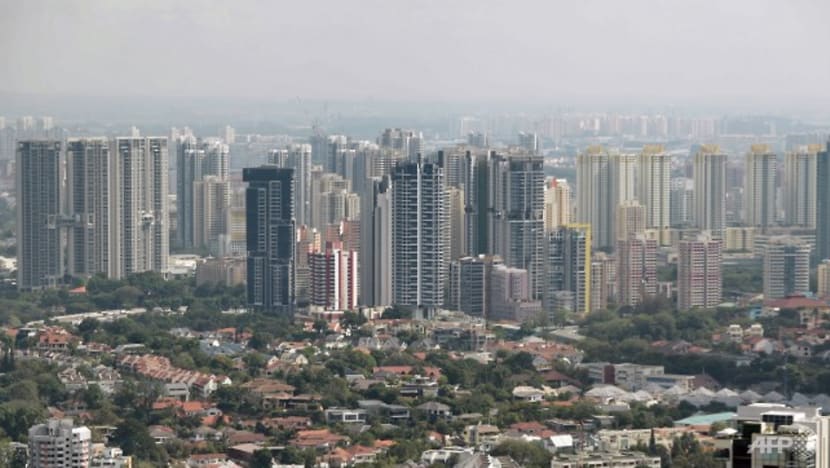Former property agent fined S$88,000 for illegally offering short-term stays to tourists on Airbnb

A view of residential housing in Singapore. (File photo: AFP)
SINGAPORE: A former property agent was fined S$88,000 on Thursday (Mar 5) for illegally offering short-term stays to tourists via online accommodation site Airbnb.
Joel Su Jiqing, who was a Propnex Realty agent at the time, is the fifth person to be sentenced for the offence and has received the highest fine so far.
If Su cannot pay the fine, he will have to serve 18 weeks' jail in default.
The 38-year-old man pleaded guilty to four charges under the Planning Act of using four separate residential properties to offer short-term accommodation to tourists, with two other charges involving two other properties taken into consideration.
Su, who is no longer registered as a property agent, earned a total revenue of S$115,112 from renting out the six premises between October 2017 and September 2018, court documents said.
Su leased mostly condominium units in the Geylang district in order to sublet them out, picking this district to avoid detection, said Deputy Public Prosecutors Gabriel Lim and Marshall Lim.
He picked Geylang as he thought the residents would be less likely to raise complaints and because the rents for private homes there were considerably lower.
Su would sign tenancy agreements with the owners of the units in his own name or the name of his company, The Coffee Cart.
He deceived the owners into signing the agreements, knowing that they would not grant him tenancy if they knew about his plan to use the units to sell short-term stays.
He did not seek permission to sublet the units knew that doing so for short-term accommodation was illegal.
However, he listed the six units on Airbnb, communicating with both local and foreign guests and giving them instructions on how to check in and out.
He answered their queries, personally met them at the units and engaged a housekeeper who would clean up after the guests.
HE WAS INVESTIGATED, BUT LIED TO URA
In November 2017, the Urban Redevelopment Authority (URA) began investigating Su for providing short-term accommodation for six nights to two guests between September and October 2017.
He lied to URA officers that he had no other such rental units, and URA was lenient towards him and did not begin prosecutorial action for what they thought was his one offence.
Su changed his Airbnb host name after this and continued to commit the crime.
In one case, a resident in the D'Weave condominium complained to URA in August 2018 about many strangers with luggage entering and exiting a unit.
The property manager of the condo inspected the unit that same day and noticed a group of Filipinos crowded at the entrance.
He asked them if they stayed at the unit and they showed him a print-out of their Airbnb booking, saying they had booked a three-night stay there for S$2,156.
The property manager got Su's number from the owner of the unit and contacted him, but Su lied to him, saying that the Filipinos were his business clients.
Su told the property manager that he should have discussed the matter with him instead of reporting it to URA, and was told that running Airbnb listings was illegal.
The property manager saw the same group of Filipinos in the condo the next day and confronted Su, who said they would be moving out the next day. The property manager sent Su a screenshot saying that short-term home rental of less than three months was illegal and punishable with jail or a maximum S$200,000 fine.
Investigations revealed that Su had leased this unit for a year from March 2018, for S$2,400 rent per month. However, he did not stay there and instead listed it for short-term stays to local and foreign guests between Mar 15, 2018 and Sep 8, 2018, when he returned the unit to its owner.
LAND USE MUST BE PROPERLY REGULATED: PROSECUTION
The prosecution had asked for a fine of S$235,000, pointing to how land use must be properly regulated in land-scarce Singapore, to ensure "peaceful enjoyment of this precious resource".
"A breach of planning regulations can disturb the peace and social harmony," said the prosecutors. "When an offender chooses to flout these regulations for his selfish gains, he makes a decision that negatively impacts the wider community."
They said Su was recalcitrant, continuing to offend despite being investigated by URA and lying to the authority.
District Judge Clement Tan said there was "dishonesty and deception involved at every turn", and persistent offending.
He said the mitigating factors raised by the defence were "unremarkable" and some even "disingenuous", referring to an argument that URA had "sent mixed messages".
He said Su would have known very well that providing short-term stays was illegal by November 2017, when he was investigated, but he continued doing so, even leasing two more premises for this purpose.
He added that he found Su's claims of remorse "diluted" by his attempts to claim ignorance of the law. He granted Su's request to make the payments in instalments.
URA said in a statement to CNA that Su is the fifth person to be sentenced for unauthorised short-term accommodation and among the first 10 to be charged over it.
Those who were sentenced were fined between S$13,000 and S$88,000, with Su facing the highest penalty.
The other cases are pending.
URA said it would continue to step up enforcement efforts against unauthorised short-term accommodation and prosecute recalcitrant offenders and those who undertake such operations on a commercial basis.
It added that property agents who are convicted of such offences can be debarred from practising estate agency work for three years. Their past convictions will be taken into account by the Council for Estate Agencies when assessing applications to rejoin the real estate agency industry.














